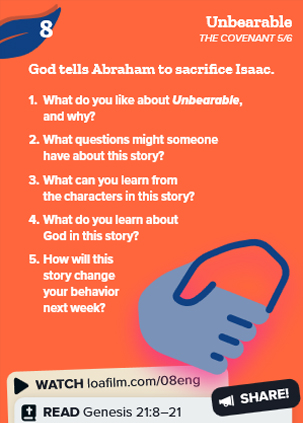Featured Videos
Ep 4: Count the Stars
Abram, a man of faith, is called on a miraculous journey. As he faces doubt and sacrifice, a divine promise ignites his hope.
Ep 6: A Son
Abraham and Sarah receive news of a son, Isaac, from God, despite their old age.
Ep 7: Torn
Abraham’s promise of a son is fulfilled with Isaac’s birth. Joy turns to tension as Ishmael’s jealousy grows.
Ep 9: Sacrifice
Abraham’s faith and obedience earn God’s promise of blessings, a lasting covenant, and a key role in His plan for humanity.
Ep 8 | Unbearable
Abraham faces an excruciating test of faith as he prepares to sacrifice Isaac, leaving Sarah in despair and their future uncertain, highlighting the intense challenges of adhering to divine will.
Bible Reference
Related Sources
Related FAQs
Here are some of the most commonly asked questions about this episo
It was a test—not to destroy, but to reveal. Abraham had previously tried to fulfill God’s promise through human means—by having a son with Hagar instead of waiting for Sarah to conceive. This act of impatience may have contributed to the need for such a test, as a way to realign Abraham’s trust. In Hebrews 11, it says Abraham believed God could raise the dead. When we pray the Lord’s Prayer—“Lead us not into temptation”—we are asking not to be placed in such trials, because being tested by God can be deeply painful. Still, this story is not about child sacrifice—it’s about surrendering everything, even the promise itself, back to God.
Yes, this story appears in the Qur’an as well, but the son is not named. Most Muslims believe it was Ishmael, not Isaac. The focus in Islam is on Abraham and the son’s submission to God’s will, not on which son. Both traditions affirm the depth of faith displayed.
Yes—and that’s intentional. In Abraham’s cultural context, especially in Babylon and surrounding regions, child sacrifice was practiced as a way to appease the gods. God’s request echoes this disturbing norm, but subverts it. By commanding—and then stopping—the sacrifice, God draws a sharp moral line: He is not like the pagan gods. Instead, He provides a substitute, reframing the event as one of divine mercy and contrast to surrounding beliefs. The story forces the reader to confront hard questions about faith, loyalty, and the kind of God we serve.
The ram becomes a symbol of substitution: an innocent life offered in place of another. This foreshadows a major theme in Christian theology—Jesus as the sacrificial lamb. God provided a way to preserve both justice and mercy.
The Bible doesn’t give Isaac’s thoughts, but many assume he was old enough to understand and trust his father—and God. This silence allows viewers to reflect on the faith of both father and son. In Jewish and Christian tradition, Isaac’s quiet compliance is seen as heroic.
The text is clear that God gave the command, but also that it was a test. Abraham had heard God’s voice many times before. In the end, God intervenes and affirms the promise. The test wasn’t about confusion—it was about total trust.
It shows that faith isn’t just belief—it’s trust, even when everything is on the line. Abraham’s faith wasn’t blind, but anchored in a long relationship with God. He knew God’s character well enough to obey, even when he didn’t understand.
Yes—God knows all things. But biblical language often speaks from a human perspective. This statement shows that Abraham’s trust was proven in action. God’s covenant is relational, and this moment deepens that bond.
















